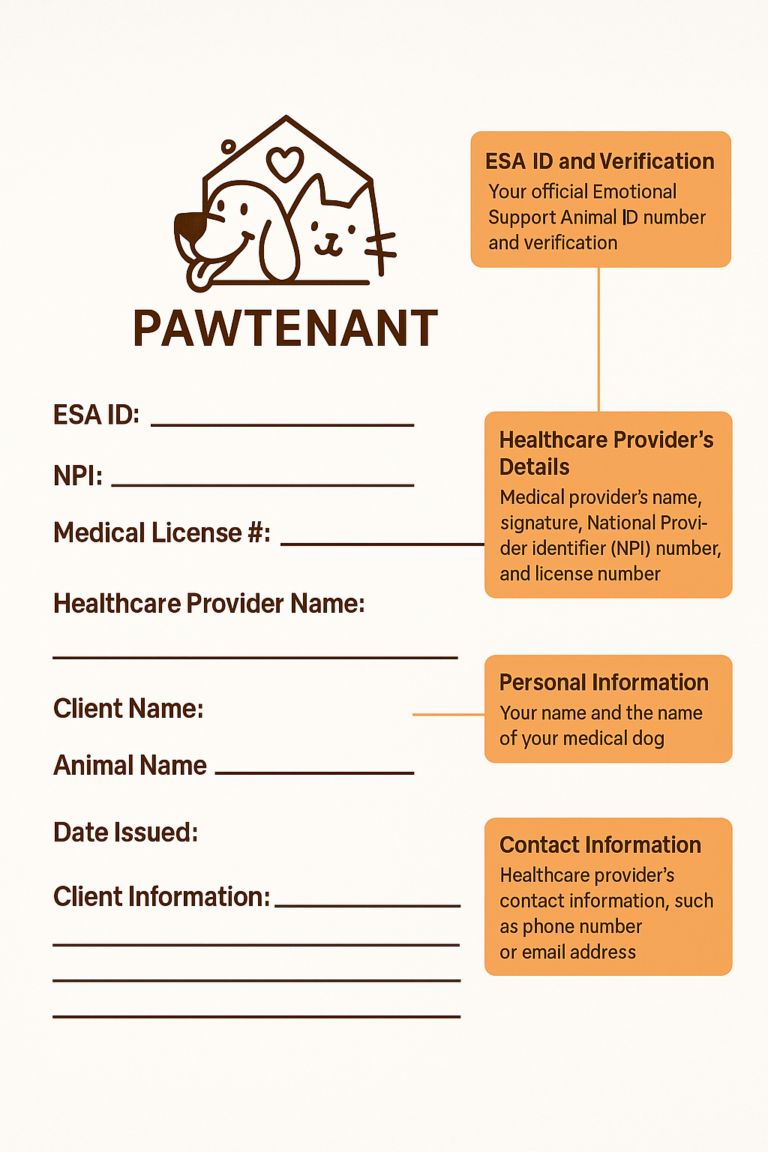

Get Your Legitimate ESA Letter Online In 24 Hours


HIPAA Compliant
SSL
Secured
100% Money Back Guarantee
Licensed Physician
Benefits Of Legitimate ESA Letter At Paw Tenant
- Certified by Licensed US Mental Health Professional
- Legally Compliant for Housing & Travel (FHAA)
- Compliant with Fair Housing Act for housing.
- Access to benefits in housing with “no pets” policies.
- Money Back Guarantee for stress-free experience.
- Dedicated customer support.
- 24 Hour Fast Delivery
Your ESA Letter Includes:

Experience An Easy Process to Get ESA Letter
Fill A Quick Online Form
You can start registration of your Emotional Support Animal (ESA) by responding to brief questions on our apply now page regarding your ESA requirements. This includes your basic info, your emotional and psychological details.
Speak to a Licensed Therapist
Your will be refered to a certified medical professional for expert consultation who will evaluate your case and determine whether you are eligible to receive and ESA letter.
Get Official ESA Letter in 24 Hours
Obtain approval for your ESA by receiving emotional support animal (ESA) letter in 24 hours. by a licensed health care professional.







Discover Paw Tenant
At Paw Tenant, we try to be a team of professionals to embrace healing power in your lives through the help of an emotional support animal. We form an enormous industry with experience of helping one person after another achieve relief, comfort, and reestablishment of welfare and health improvisation with the company of an Emotional Support Animal.
We at Paw Tenant make it an endeavor to offer comprehensive, efficient, and accessible consultations to users requiring Emotional Support Animal Letters. This opens up the doors for people with emotional or mental health disorders to feel the transformative impact of having an ESA as a companion. We are here to ensure our clients gain the information and support they need in order to navigate this journey both competently and compassionately.

What Is An Emotional Support Animal?
An emotional support animal is a special pet that provides comfort and calm to people facing mental or emotional challenges. These animals, often an emotional support dog, cat, or even a rabbit, help improve mental health by offering companionship and love.
Unlike service animals, which are trained to perform specific tasks like guiding or alerting, emotional support animals focus on emotional pet support. Their presence alone can make a big difference, helping you feel less stressed or anxious.
For example, an emotional support dog might curl up next to you during a tough day, offering a sense of calm that eases your worries. The benefits of emotional support animals are backed by research showing that pets can lower stress and boost mood.
Laws, like the Fair Housing Act, recognize the importance of emotional support animals, allowing them to live with you in housing that might otherwise ban pets. This legal support ensures you can keep your ESA dog or other pet close, providing consistent emotional support animal benefits wherever you go.
Who Qualifies for an Emotional Support Animal?
The qualified persons for Emotional Support Animals (ESAs) are the ones who possess an emotional and mental issue that interferes with all aspects of their life. Such disabilities may include:
- Anxiety
- Depression
- Post-traumatic stress disorder (PTSD)
- Personality Disorders
- Stress
- Phobias
- Schizophrenia
These are the some emotional and mental health issues individuals are encountering now-a-days. The well-documented benefits of pets on mental and emotional well-being is obvious. Subsequently, many emotional and mental health circumstances can change positively due to the existence of a support animal.
What Is A Service Animal?
Service animals, often dogs, are specially trained to assist people with disabilities. They perform specific tasks, such as guiding someone who is visually impaired, alerting a person who is deaf to important sounds, or helping someone with mobility issues move around safely. Unlike emotional support animals, which focus on emotional pet support, service dogs are highly skilled and trained for their roles.
While emotional support dogs provide comfort through companionship, service animals offer both practical assistance and some emotional support, making them essential for improving their owner’s independence and quality of life. Service dogs have broader legal protections, allowing them to accompany their owners in public places like stores or restaurants, whereas ESAs are mainly supported in housing and some travel situations. Understanding this difference helps clarify the unique role of emotional support animals in mental health care.

PET CARE TEAM
Meet Our Compassionate Licensed Care Team

Dr. Lytara Garcia
Dr. Lytara Garcia is a pet expert and Licensed Professional Counselor. She started her work as an Animal Assisted Therapist to assist people facing trickery chronic mental health issues such as depression and anxiety with the help of animals. She approaches her therapy beyond the traditional model because she takes into account this profound connection between human being and animals.

Dr. Stephanie White
Dr. Stephanie White is a licensed and qualified Clinical Social Worker. Since 2002, I have gained advanced counselling training. She use Teletherapy Services to walk you through the struggles with the aid of evidence-based practice and care. Stephanie White is licensed in multiple states including TX, HI, AK, CA, FL, and NV. Moreover, my objective is to transform lives through Grow while promoting self-sufficiency. Let's embark on a better mental health journey today!

Dr. Robert Staaf
Dr. Robert Staaf, MD, has family medicine practice in Buffalo, New York, and his care is given one-on-one for every patient. He is well-equipped with extensive medical training to offer proper care in a professional environment built on trust and open communication. The patient is offered holistic care, while Dr. Robert Staaf keeps a keen eye on the medical developments. He understands the welfares of an emotional support animal in the life of the patient.

Dr. Rebecca Watson
Dr. Rebecca Watson earned his B.A from Alabama. Attained graduation from the University of Alabama with minors in Biology and Chemistry, at Birmingham with rugby as a favorite pastime. Medical degree was attained from Columbia University College of Physicians and Surgeons in New York City. After completion of his internship as well as his residency at Washington University in Saint Louis.


How Much Is An ESA Letter At Paw Tenant
Our ESA letters work for all housing, from rentals to dorms. Our licensed mental health professionals ensure your legitimate ESA letter is legally valid and authentic. With our money-back guarantee, you can feel confident knowing you’re getting a trusted emotional support animal letter at a great price.
ESA UP TO 2 PETS
ESA UP TO 3 PETS
Why Choose Us?
We have a one-of-its-kind money-back guarantee. We can give you a stress-free experience with your pet. In case your legitimate ESA letter doesn’t serve the purpose or there is an illegal denial by your landlord, we will refund your full money. Our policy is affirmed with a 100% money-back guarantee for two causes. One of the reason is that you didn’t qualify yourself in the interview. Another reason could be the rejection done by your landlord even though HUD complaint is filed. We value your satisfaction and stand behind the potency of our ESA letters.
For the impactful paybacks of ESA, take it with easiness. With Paw Tenant and enjoy the easy process with our trusted medical physicians guiding you thoroughly. Embrace the positive emotional support animal benefits to enjoy your life with a furry friends.
POPULAR QUESTIONS
Frequently Ask Question
An emotional support animal can put numerous beneficial effects of the mental health of people facing different mental or emotional health issues. However, you cannot attain these type of benefits from service dogs. These dogs are trained to perform any kind of task for the disabled, an ESA offers companionship and emotional support. Staying with an ESA can helps people minimize their anxiety, depression and loneliness because, essentially, an ESA is the same as a companion-constant stability and comfort. You can even do exercise with your ESA, and it is observed to increase relaxation. With help of it, you can improve your blood pressure, dopamine, and serotonin. Plus, an ESA can be a good encouragement of social interactions because they generally seem to be conversation starters and make people feel more attached to others. Consulting a licensed and qualified mental health doctor will ensure if emotional support animal can be a good option. They can help you complete all the necessary documentation to produce ESA letter so that you can access certain amenities and privileges for ESAs.
No, emotional support animal registration or esa certification is not essential. Unlike the training of a service dog that enables it to assists specific tasks for a disabled person so that they can be supported. ESAs accompany a person to help them improve their mental health with the aid of companionship and emotional support. Online services provided by different websites offer registration of an ESA, but these registries themselves are not legal and not considered necessary by law. Although documentation is always useful, but ESA letter from a licensed and qualified mental health doctor is necessary and it is considered as a more legal evidence of ESAs. This documentation is a form of recommendation from mental health professionals, which can be used in obtaining travel privileges and housing accommodations. You can consult legal and qualified mental health professionals to understand all the laws and regulations relating to ESAs in your state or locality.
Unfortunately, emotional support animals cannot accompany you in every public place they don’t have same public access protections like service dogs. The reason is that service dogs accompany disabled persons and are trained to work on specific tasks to help them in daily life. ESAs, however, do not carry the same rights. ESAs entrance are prohibited in different locations like superstores, restaurants or other locales that state that they do not allow pets. However, in case of housing accommodations ESAs are allowed with their owners even if these house have ‘no pet’ restrictions. It was approved under Fair Housing Act. As per Air Carrier Access Act, you can even accompany your ESAs on certain flights. Notably, each establishment has its respective rules and regulations concerning ESAs. So taking your ESAs to different public places, you should know their guidelines.
An ESA letter, allows a person to seek privileges or accommodations, perhaps related to having an emotional support animal. ESA offers support and comfort for depression, anxiety and other patients with their presence. Whereas, service dogs are trained with specific skills so that they can do specific tasks for disabled people. This makes disabled ones supported in their daily routine activities. In fact, using an ESA letter you can potentially get protection from the Fair Housing Act, which provides the ability to live in houses that would otherwise violate its pet restriction policies. Moreover, an ESA letter may make it possible for an individual to be accompanied by an emotional support animal on flights. As per Air Carrier Access Act, if you carry ESA letter with yourself you can carry your pet in the cabin of an aircraft. Using an ESA letter you cannot get access to public places that don’t allow pets. However, service dogs are the only ones who have broad public access rights.
Yes, the Fair Housing Act (FHA) is applicable on ESAs. This federal law is produced to eliminate any sort of discrimination in housing accommodation based on person’s disability. Under this law, housing providers are needed to offer reasonable adjustments on their behalf, which also includes emotional support animal owners. Thus, people with a legal ESA letter would most likely be permitted to accommodate their emotional support animal in houses, where pet restriction policies are laid. Other conditions that may be enforced by the housing provider include documenting the reasonableness of the need for an ESA. It is important to mention that, although the FHA protects individuals and ESA’s rights in housing situations, the FHA does not afford emotional support animals broad public access rights as those service dogs enjoy.
There have been changes to the rules and regulations for air traveling with emotional support animals. New regulations relating to air travel was produced and applied starting from 2021. The U.S. Department of Transportation has changed rules in the Air Carrier Access Act (ACAA), Emotional support animals under this new regulation are no longer considered service animals for flying with their owners aboard airlines. However, individuals with disabilities are not prohibited from traveling with service animals. If you have an emotional support animal, then it falls squarely within the policy of the airline about pets. However, most airlines began to require ESAs to be classified as pets. These airlines are taking a fee to carry ESA in the cabin. Nevertheless, these rules and regulations are implemented by some airlines and not everyone has these rules. It is also important to contact your airline beforehand for their policies on emotional support animals. These vary between airlines, so it is always important to check ahead of time to and keep up-to-date documentation and vaccination details about your ESA.
If you want to qualify for an ESA, you can follow these steps to get one. First, you are supposed to seek a consultation with an ESA-qualifying mental health professional who will assess your health conditions to govern your emotional or mental health issues. This will help them determine whether you qualify to have an ESA. These professionals may be therapists, psychologists, or psychiatrists, and they should be licensed. This letter will then be given to you by them if they believe you will need an ESA. This formal, written documentation helps you verify that you need an ESA and which can provide rights under and protections of the law.
As soon as you receive your ESA letter, it’s time to locate a suitable pet. Service dogs requires certain breed requirement but in case of emotional support animals, you don’t need any such specifications in your pet. You can opt for a cat, dog, or even another domesticated animal that may be comforting and supportive of your needs. However, you must consider different aspects of your lifestyle, living conditions, and allergies or any restrictions you may have as per recommendations of your mental health professional.
It is worth mentioning that there is no such thing as certification or official registry for emotional support animals. Some websites claim that they are offering the option for certification and registration of emotional support animals; however, these documentations are usually considered as unnecessary and not really considered legal. The legitimacy of an ESA letter from a licensed and qualified mental health expert is important to get an emotional support animal.
Last but not least, it would be best to know the local laws and restrictions concerning emotional support animals. The FHA will protect ESA in housing contexts; therefore, individuals can stay with their pets in housing that restricts pets. However, ESA rules may differ in public places like in superstores or restaurants. Always check the local laws and establishment policies to avoid any inconvenience while ensuring compliance of emotional support animal.
Always access a licensed and qualified mental health professional to obtain an emotional support animal. The reason is that they will work through the authentic process to ensure that it fits your situations and prerequisites.
Legitimacy Guarantee – Some of the aspects surrounding the legitimacy of our ESA letters are as follows –
Licensed Professionals – We give you access to licensed medical providers who are expert in mental and emotional health issues. All of them are qualified and have passed board exams. Professionals are selected as per your state so that they can easily help you approve your ESA Letters.
Phone Consultation – Our practitioners establish communication with you over the phone, and that is a valid basis upon which we can give you the ESA letter.
Compliant Letters –A licensed medical professional issues an ESA letter. It carries the direct contact number and license number. The letter is written on professional letterhead with all the legal requirements that exist for an ESA prescription.
This letter is produced by a licensed and qualified mental health doctor. It is a documentation that authenticates your need to get an emotional support animal. Although the law does not mandate renewal of the ESA letter, it is worth paying attention to the date when it expires according to the letter.
It is often advised that the mental health professional updates the ESA letter yearly or whenever there is a change in circumstances. In some cases, the housing providers or airlines may have a requirement regarding the letter’s validity date, usually within the last year. Besides, your treatment plan can change according to your circumstances, however, these may change over time. It is important that your ESA letter must be a reflection of your current mental health needs.
When you want to renew your ESA letter, you should consult with qualified mental health doctor to reevaluate if you are still in need of an emotional support animal or not. They will critically evaluate your mental health and recommend you if your health have improved with the therapeutic effects of ESA. If you need more therapy than they will recommend a renewal of ESA. After a medical check-up they will determine if ESA is still appropriate for you, under these conditions they will produce a renewed ESA letter. This ESA letter will be a documented proof of your ESA renewal with an updated termination date.
You must check additional guidelines of housing associations or providers, airlines, and other institutions to preview all the documentation requirements that you may encounter. Using these guidelines you can easily comply with strict regulations when securing housing accommodations or traveling through different airlines with your emotional support animal. By following all these strict regulations and guidelines you will not face any inconvenience.
It basically depends on your overall mental health status and can be decided only through a consultation with your mental health professional, considering your specific personal situation and prerequisites required for mental health improvements.
Yes. Quite a few animals can be registered on one ESA letter. It will tailor your specific needs so you can use it to register single or even multiple pets. However, your physician should be aware of about the role of each animal in the treatment of your emotional support. So, if you have several pets, all these can be included in one ESA letter as emotional support animals.
Yes, if you already have a pet you can qualify it as an ESA. However, you can’t qualify service dogs as an ESA as these are specially trained and assigned to assist with specific tasks for individuals who have disabilities. ESA provides companionship, comfort, and emotional support to patients who are dealing with mental health issues. You can opt for any breed or species, as there are no specific requirements for ESA; however, only certain pets are acceptable. You can approach a licensed and qualified mental health professional for attaining ESA letter, which will make you an eligible ESA. The letter provides a documented proof regarding your mental health creating a need for emotional support animal. An ESA can be applied for by contacting a qualified professional and determining if your current pet already qualifies as an ESA and by receiving the necessary documents from a qualified professional.
OUR CONTACTS


Contacts
We’d love to hear from you! Whether you have a question, feedback, or need assistance, feel free to reach out to us.
Phone
(409) 965-5885
Location
2122 United States
Open Hours
Saturday: 9am – 4pm
